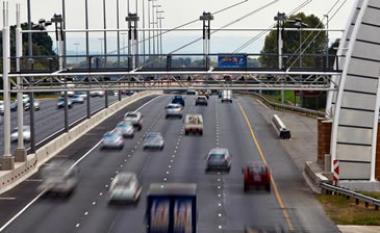Gauteng e-tolls will impact Property Buyers
 Traffic pours under one of the many e-toll gantries along the N1 highway. Proposed tolls could increase an individual's monthly expenditure by as much as R550
Traffic pours under one of the many e-toll gantries along the N1 highway. Proposed tolls could increase an individual's monthly expenditure by as much as R550
The implementation of e-tolling on Gauteng's major highways, which now seems imminent before Christmas, will have significant impact on where buyers will choose to purchase property in future.
According to a survey conducted by bond originators Ooba which showed 80% of respondents would consider Gauteng's toll road routes when selecting property.
Of the rest, 13% said they would not be influenced and seven percent were not even aware of the tolls.
Jan Davel, MD of the RealNet real estate franchise group, said: “We expect, for example, that there will be much more demand among young buyers for flats and townhouses in inner city areas close to their workplaces and in those suburbs close to Gautrain and MetroRail stations and on convenient bus routes.
“In fact, we think that access to good public transport could become a factor almost as important as price, because being able to go without a car and all the related expenses may well make all the difference for such consumers between being able to buy a home and having to carry on renting. Location, location, location will in this sense become the top property consideration once more.”
Among older, more established buyers with families, he says, there is likely to be sharply increased demand in the heritage suburbs for homes with space for home offices – “even if it’s just a garage or an outbuilding that can be converted” –so that owners can cut down on office commutes and gain easy access to good schools and convenient shopping.
“And once again, we think they will be prepared to trade off a somewhat higher home price against lower transport costs, especially if they can also save much of the time they used to spend in traffic.”
Thirdly, Davel, says, there will be continued demand for homes in self-contained estates that have their own schools, shops and are close to decentralised office nodes. “In this case, however, buyers will be looking to limit home costs as they will probably still have to bear some commuting expenses. Consequently, the highest demand will be for the more compact, more affordable houses and townhouses which are now becoming available on many more lifestyle estates, and for homes in the newer, estate-like sectional title complexes.”
From an investment point of view, he says, the introduction of e-tolling can also be expected to boost the demand for rental homes close to workplaces, good schools and public transport hubs, and for any student accommodation that makes it possible for students to do without a car.
“What is more, consumers elsewhere should not dismiss these trends as only being applicable to the Gauteng market, as the National Roads Agency (SANRAL) has clearly stated its inteation of rolling out electronic tolling on highways and new roads countrywide.
“In addition, Finance Minister Pravin Gordhan said in his mini-Budget speech last week that the costs of much of the new infrastructure the government proposes to build over the next few years, including roads, would be recovered by charges levied on the users.”













